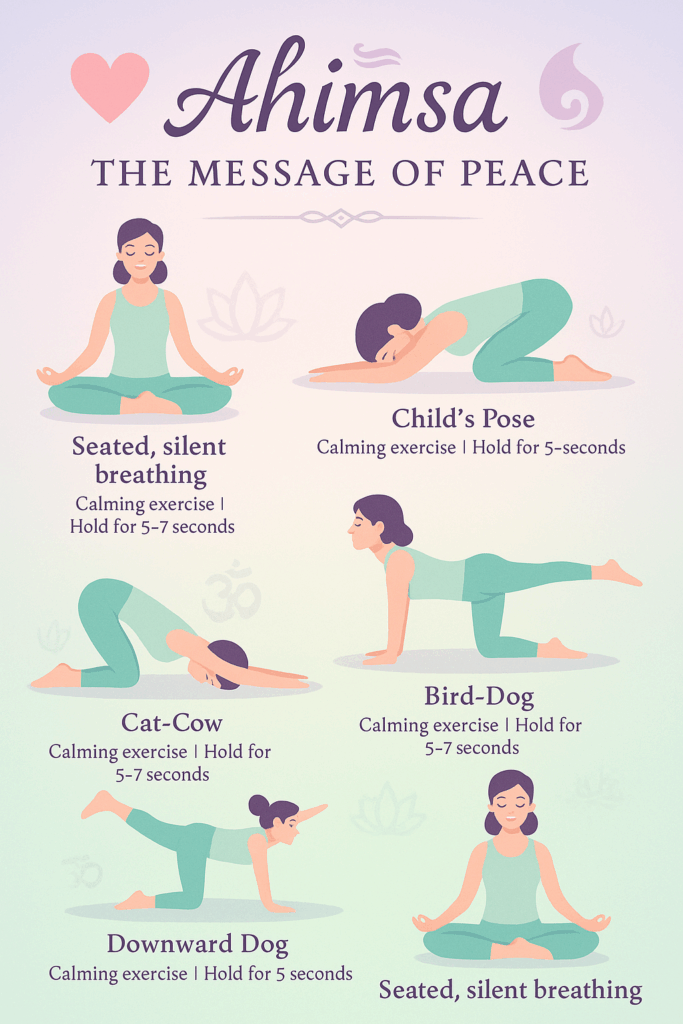Ahimsa: The Message of Peace
Patanjali, the father of Yoga, begins his teachings with a message of love, friendship, and peace. This is the foundation of all meaningful human connections. Yet, humans are a blend of opposites—within us exists not only the capacity for love but also the powerful force of anger.
Life itself is an expression of vitality and love, standing in contrast to death, destruction, and aggression. Anger and love are two sides of the same coin: when anger arises, love recedes; and when love shines, anger fades into the background.
The Sanskrit word Ahimsa means non-violence or freedom from harm. While anger is rooted in the animalistic instincts within us, love and tranquility spring from the divine essence of our being. Anger nurtures traits like resentment, hatred, jealousy, and vengeance, whereas peace fosters compassion, kindness, and empathy.
Throughout life, all human beings seek peace, pleasure, and security. These three elements are the foundation of most of our pursuits. When these basic emotional needs are threatened, the instinctive human response is often anger.
Anger is an explosive, damaging reaction to stress, emotional pain, or the experience of injustice or disappointment. It manifests in several ways, which can be categorized into three levels:
1. Verbal Aggression
Yelling, screaming, cursing, blaming.
2. Physical Aggression
Hitting, punching walls, throwing objects, self-harm.
3. Internal Aggression
Self-loathing, internal resentment, silent suffering, crying spells, cursing silently, harboring grudges.
Verbal and physical aggression can disrupt relationships and nurture harmful traits like vengeance and envy, distancing us from our higher nature.
Internalized anger, in addition to its emotional toll, often leads to psychosomatic and mental illnesses such as depression, anxiety, chronic pain, or dysfunction in various body systems. Prolonged stress from unresolved anger disrupts the body’s biochemical balance and may increase the risk of serious diseases such as hypertension, diabetes, heart disease, and even cancer.
Therefore, managing and releasing anger is essential for both physical and mental health. To achieve this, one must develop practical and mental techniques to increase resilience in the face of life’s challenges. Ahimsa must be practiced in thought, word, and deed.
When we adopt positive thinking, kind speech, and calming, supportive actions, we embody Ahimsa. God is the essence of love, and we are the living reflections of that love. Wherever love and peace flow, the fragrance of the divine is near.
Practice: Restoring Peace through Gentle Yoga
Calmness is the antidote to aggression and tension.
To cultivate tranquility in both body and mind, practice the following gentle yoga flow. Hold each posture for about 5–7 seconds and repeat the full sequence 5 to 6 times.
Sit on your knees. Close your eyes and breathe slowly and silently.
Spread your knees apart and bend forward, placing your hips on your heels and arms stretched in front of you.
Come to all fours. Inhale as you arch the back, exhale as you round it—like a cat and cow.
Still on all fours, extend the right arm and left leg, then switch to left arm and right leg.
From all fours, lift your knees and form an inverted “V” shape (Downward Dog).
Lower your knees and return to the child’s pose (as in step 2).
Return to the starting position and breathe gently.

